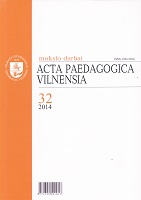Socialinis teisingumas Lietuvos mokyklose: grindžiamosios teorijos pagrindu
SOCIAL JUSTICE IN LITHUANIAN SCHOOLS: ASPECTS OF THE GROUNDING THEORY
Author(s): Olga IljinaSubject(s): Education
Published by: Vilniaus Universiteto Leidykla
Keywords: klasikinė grindžiamoji teorija; socialinis teisingumas; mokykla; suvokimas; rūpestis
Summary/Abstract: The concept of “social justice” is very popular and widely used not only in schools, but also in everyday life and language. It is one of the most ambiguous, controversial and vague concepts used in social sciences. This is evidenced by a huge variety of definitions of the concept in dictionaries, scientific literature, and expert comments. Some scholars equate social justice to equality, equal opportunities, fairness (Scherlen, Robinson, 2008), while others – to the possibility of working together with different people in a multicultural society, seeking harmonization (Morales, 2005; Lipman, Monkman, 2009), yet others – to the values which every person refers to when evaluating the fairness of a situation (Suhay, 2008), or even to the impropriety of the concept, its inability to define true justice (Bouillon, 2012). These are only a few examples of attempts to define the concept. The increasing number of scholars (Adams, Bell, Griffin, 1997; Ayers, Hunt, Quinn, 1998; Darling-Hammond, French, Garcia-Lopez, 2002; Marshall, Oliva, 2006; Irving, 2005, 2009; Gutstein, Peterson, 2005; Morales, 2005; Young, Mountford, 2006; Bell, 2007; Gitlin, 2009; Jean-Marie, Normore, Brooks, 2009; Murray, 2011; Stewart, 2012) argue that the lack of exact definition of the concept makes it impossible to understand what the users of the concept mean by it, not to mention understanding how social justice manifests it self in schools. Therefore, the goal of the paper is to find out how social justice is perceived in Lithuanian schools and to discuss a specific theory, based on the experiences of schools. Therefore, based on the classical approach to the grounding theory, this article explores how school administrators, teachers, students, parents, and other school personnel perceive and experience social justice in Lithuanian schools. Based on the data of this study, authentic experiences of the study participants are discussed. The major social issues experienced in schools are disclosed and the “harrowing collision” theory is briefly explained, which allows moving away from the definition of social justice presented in the conventional literature. Finally, it is stated that the concept of social justice is too abstract and does not have a well-established definition which would be self-explanatory and recognized not only in schools, but also in other fields. Therefore, it is constantly interpreted and appended to match the expectations of the people in question. In such a situation, the participants of the study accept the fact that their perceived sense of justice is impossible and instead try to conform to a “superficial social justice” which manifests itself in the context of a lack of general social justice in schools. The diversity of the participants becomes an indicator for the “superficial justice” and an important developmental factor when some participants experience such justice more than others.
Journal: Acta Paedagogica Vilnensia
- Issue Year: 2014
- Issue No: 32
- Page Range: 133-146
- Page Count: 14
- Language: Lithuanian

